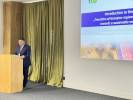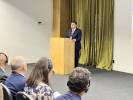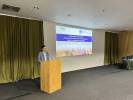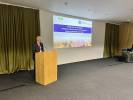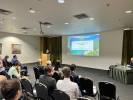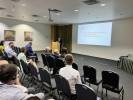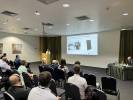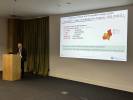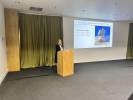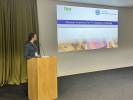A conference on "Solar energy for sustainable development of Georgian Cities" was held in Tibilisi on 5 September. The conference was organised by the Institute of Renewable Energy (IEO) as part of the work on the "Photovoltaics for Georgian Cities" project, which is being implemented by IEO in cooperation with the Energy Efficiency Centre in Georgia (EECG), commissioned by the United Nations Industrial Development Organisation (UNIDO), in agreement with the Georgian government and with the support of the Polish Ministry of Foreign Affairs (MFA) and the Ministry of Development and Technology (MDT).
The project focuses on promoting and supporting the implementation of photovoltaic (PV) investments in five Georgian cities: Khokhatauri, Gori, Kutaisi, Poti and Zugdidi. The objective of the activities is to develop 10-12 feasibility studies for pV investments on public buildings (or in their immediate surroundings), which will translate into accelerating the energy transformation of Georgian communities. You can read more about the project here.
The conference was opened by Mr. Marco Matteini, Project Officer from UNIDO's side, who welcomed the guests and introduced the topics of the project. After that, the representatives of the Georgian and Polish governments gave their speeches. Poland’s Ambassador to Georgia, Mr. Mariusz Maszkiewicz, was present at the conference. He reaffirmed his approval and support for the ongoing project, seeing it as a great potential and an opportunity to strengthen international cooperation. Representatives of Georgian ministries were also present. Ms. Mzia Giorgobiani, Deputy Minister of Regional Development and Infrastructure, emphasized the project's value for the development of Georgian cities. The Georgian Ministry of Economy and Sustainable Development was represented by Deputy Minister Mr. Romeo Mikautadze, while Mr. Shota Gunia represented the Georgian Ministry of Finance.
The main issues, opportunities and challenges for the project were introduced to the participants by Mr. Grzegorz Wiśniewski, President of the Renewable Energy Institute. The IEO president recalled a previous visit to Georgia, which took place as part of the 2019 project implementation. Over these few years, photovoltaics have strengthened their position in the European energy market.
A presentation by Ms. Margalita Arabidze of Georgia's Ministry of Economy and Sustainable Development showed that the entire project fits into Georgia's development plans, local energy policy and the so-called SECAP (Sustainable Energy & Climate Action Plan), in which municipalities determine how they intend to implement their sustainable development with climate protection investments.
Ms. Agata Czyrsznic-Dobrowolska from the Polish Ministry of Foreign Affairs spoke about the importance of government support for the development of the photovoltaic sector. Support programs such as My Electricity, Clean Air Energy Plus were mentioned. The MFA representative also spoke about the Photovoltaic Sector Agreement, which is an important step for the development and strengthening, as well as cooperation of the PV industry.
The conference highlighted to Georgian participants that Poland has proven technologies in renewable energy generation. These technologies have also been verified in practice by applying them to various projects in Poland and abroad. This was also the case in a project implemented through UNIDO earlier in Moldova, which was discussed by Mr. Henryk Czubek, a representative of the Polish Ministry of Foreign Affairs (head of the UNIDO Team). At the same time, the mechanism of promotional support for these technologies that operates in Poland on the basis of the GreenEvo initiative was presented.
Participation in the conference allowed the participants to better understand the essence of the project and the purposefulness of the activities, among other things, by showing the photovoltaic success that Poland has achieved in recent years, becoming the third country in the world in terms of prosumer photovoltaic installed capacity (right behind Australia and Germany) and the fourth country in the EU in terms of annual growth in total installed photovoltaic capacity, which was discussed by Agata Krzyżanowska (IEO).
Polish presentations showed that Polish companies have experience and developed technology.
Georgia has excellent solar conditions for the development of photovoltaics, and Georgian laws are quickly being adapted to EU legislation, IEO President, Mr. Grzegorz Wiśniewski, said during his speech. Georgia, for example, has a prosumer support system similar to Poland's, but with the difference that PV installations can be up to 500 kW (in Poland only 50 kW).
UNIDO project coordinator from IEO, Konrad Wiśniewski, presented preliminary economic analyses of investments in prosumer photovoltaic installations in Georgia. The results, taking into account both geographic and local legislation and market conditions, showed that the payback period for such investments would be between 5 and 7 years. This is very good news for future Georgian prosumers, who can benefit in their country from a very transparent way of accounting for the surplus produced by PV installations. Comparisons have shown that PV installations in Georgia can yield up to 30% more electricity than if they were built in Poland. This is a very good prognosis not only for the implementation of the UNIDO project, but also for the entire PV industry in Georgia. A presentation by Ms. Maia Melikidze from the Georgian National Commission for Energy Regulation and Water Supply introduced the conference participants to the structure of renewable energy in Georgia and gave them an even better understanding of the operation of photovoltaics and the billing system for electricity from RES installations.
The conference ended with a panel discussion that included representatives of the participating cities. It was a time to exchange experiences, present views and seek answers to questions about the implementation of the project.
As part of the discussion, Georgian local governments and authorities expressed their interest in various financing options for photovoltaic projects. Among other things, they considered the use of bank loans dedicated to investments in renewable energy sources and noted the scarcity of such solutions in the market. It was pointed out that in today's turbulent times, there is increased concern about energy security, the capacity of power grids, or energy prices, on which local governments spend a significant portion of their budgets. Representatives of the authorities of Georgian cities participating in the project: Khokhatauri, Gori, Poti, Zugdidi and Kutaisi have expressed readiness to invest in photovoltaics. They are fully aware, in the face of the energy crysis, of the need to seek new solutions in obtaining energy.

Discussion panel with representatives of local governments of participating cities. The discussion panel was moderated by Mr. Konrad Wiśniewski (IEO) and Mr. George Abulashvili (EECG), and was attended by (from left): Mr. Beqa Vacharadze (mayor of Poti), Mr. Ioseb Khakhaleishvili (mayor of Kutaisi), Mr. Vladimer Khinchegashjvili (mayor of Gori), Mr. Davit Sharashidze (mayor of Khokhatauri), Mr. Besik Tchezhia (deputy mayor of Zugdidi).
The discussion was also attended by representatives of Georgian non-governmental organisations and education centres involved in promoting renewable energy in Georgia. Great interest and willingness to implement the project was felt on the part of Georgian partners at the central and local levels. The "Photovoltaics for Georgian cities" project has received a positive reception and commitment from the Georgian community, government representatives, municipalities and institutions. The value of good cooperation of different communities at the national and international level in achieving the goals of the project was emphasised by Mr. Marco Mateini during his summary of the conference.
Key partners involved in the project (photo below) and financing institutions will meet on the occasion of the next conference at which feasibility studies of photovoltaic investments on selected public buildings in participating cities will be presented.

More information (download):
Photo gallery:






